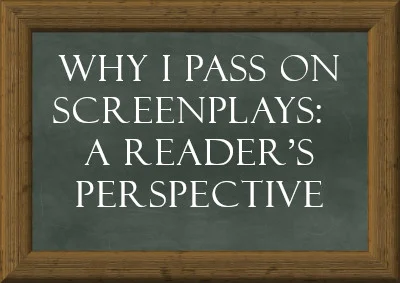This class has concluded.
Guests cannot sign up for Talentville classes & webinars.
Become a Talentville resident and get access this and other classes.
--Billie Harris
--Rick Potter
--Barbara Ashley
--Rick Potter
--Former Resident
--Rick Potter
--Wayne Johnson
--Former Resident
--Billie Harris
--Former Resident
Why I pass on Screenplays: A reader's perspective

Since 2002, Tennyson Stead has been working in film development more or less non-stop. In that time, he's read thousands of screenplays...and in that time, he's probably written coverage that recommended a script around twenty times.
How can that be? Are there truly no good writers in Hollywood, or is there something else going on? Why is threading the needle of film development so challenging?
In this interactive discussion, Tennyson goes over some of the reasons he passes on scripts he reads, and answers member questions about all things coverage.

Tennyson E. Stead an award-winning writer, director, and script doctor who has written over 50 screenplays, with ten scripts produced, sold, or under option in addition to dozens ghostwritten as work for hire. Compounding more than 25 years of production experience on stage and screen, Stead has also logged over a decade of experience as an independent film development and finance executive.
Today, Stead's efforts include serving the film industry as a screenwriter, script doctor and ghostwriter, as well as writing and producing a very ambitious space adventure gaming and transmedia project called Jump Rangers. Recent, credited screenwriting work includes Emagine Content's tentpole sci-fi action film Atlas Uprising, and director Michael Wohl's vicious Hollywood satire Making the GAMP.

Ben Cahan created and co-founded Final Draft, the worldwide leader in screenwriting software. It is used to write over 90% of all movies and TV shows produced worldwide.
He is currently the CEO at Talentville, with the goal to create an entirely new market for aspiring screenwriters to improve their skills and network with other writers, and also to provide a gateway to reach and interact with industry professionals, from agents and managers to producers and production executives.
with Tennyson Stead
In twenty years providing script coverage, I have probably written coverage that recommended a script around twenty times.
How can this be? Are there truly no good writers in Hollywood, or is there something else going on? Why is threading the needle of film development so challenging?
In this interactive Q&A session, I will be discussing a few of the following reasons:
- Most screenwriters come from literature or journalism these days, and there are some big differences between writing for a reader and writing for actors.
- What we're talking about is the difference between active and passive writing, which in dramaturgical terms is the difference between action and reaction.
- Most film executives and most managers come from the business world, or just from business school, and have no idea what these differences are.
- Even if they don't know how to articulate it, they can feel that something's missing. Inevitably, they interpret that feeling as a "tonal" problem. It's not a tonal problem. It's structural.
- If we work from the action, we support the actor's performance instead of asking them to sell our story.
“Great presentation - I look forward to the documentation to really understand his points. Although what he said wasn't revolutionary - it was explained differently today and I really liked that.”
-- Shay Elliot
“I was looking for real, tangible insights about what readers look for and why they discard certain scripts. What I gleaned from this webinar was the subjectivity of readers and the variety when it comes to expertise. It's a crapshoot. Networking is one of the essential elements. Sadly, many creatives' strong suit is not networking (formerly "schmoozing") or business. ”
-- Lindsey Morrison Grant
“Great speaker. Generous with his knowledge. Really annoyed and learned from it”
-- Brian Moore
“Excellent class.”
-- Former Resident
“It was wonderful to hear Tennyson speak and be able to relate what he said to the screenplays I am developing with the writers as the producer of them.”
-- Rosemary Marks
-- Ramesh Iyer



